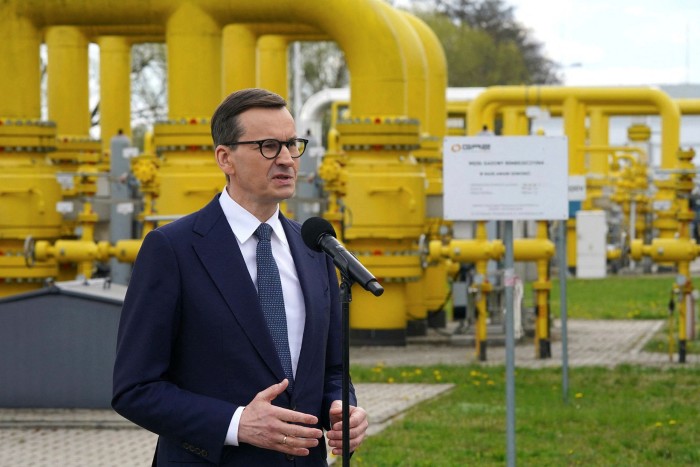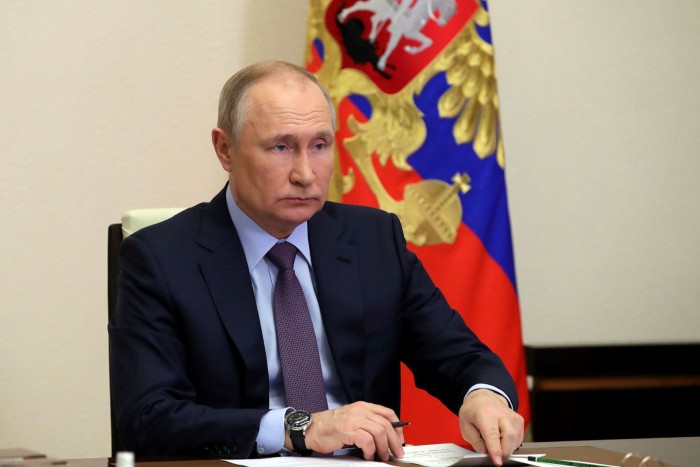Russia has initiated its biggest counterattack against EU sanctions by cutting the flow of gas to Poland and Bulgaria because of their refusal to use a new payment mechanism that allows Moscow to access the cash it receives for its energy exports.
The move by Gazprom, Russia’s state-backed gas supplier, has jolted global gas markets, pushing prices higher and providing a reminder of the Kremlin’s willingness to withhold energy exports from Europe.
As well as heightening fears over the bloc’s energy security, the decision by two member states to reject the Kremlin’s new method of payment — which involves converting euros into roubles via special accounts opened at Gazprombank — and endure an end to gas flows has pushed the question of European unity against Russia to the forefront.
Why is this happening now?
At the end of March, Russian president Vladimir Putin decreed that gas buyers from so-called “unfriendly” nations, which includes all of the EU, had to set up both foreign currency and rouble bank accounts with Gazprombank in Switzerland to pay for their supplies. The measure was seen as a way of neutralising EU sanctions against Russia’s central bank.

Since then debate has raged on whether the scheme — in which buyers pay for gas by depositing euros or dollars with Gazprombank, which in turn converts them into roubles using so called “K” accounts — breaches both EU sanctions against Moscow and gas supply contracts. Gas supply contracts specify the currency of payment, which is euros and dollars for almost all in Europe.
Putin’s stated demand has been that buyers of Russian gas pay in roubles. The debate on Moscow’s proposed mechanism using Gazprombank — which the EU carefully excluded from sanctions — centres on whether paying this way amounts to a rouble payment, or a payment in foreign currency.
Russia’s scheme came into effect on April 1. Poland and Bulgaria, two of the EU’s most vocal advocates of quickly cutting reliance on Russian gas, happened to be the countries whose payments were due soonest, as stipulated in their contracts.
How will the loss of Russian gas impact Poland and Bulgaria?
Poland and Bulgaria import large volumes of Russian gas, accounting for 45 per cent and 80 per cent of their needs, respectively, according to the International Energy Agency. Together their contracts permit them to import 13bn cubic meters of Russian gas, equivalent to about 8 per cent of the EU’s imports of Russian gas last year.
However, the halt to these supplies is not expected to cause serious problems for either nation because of the drop in demand during warmer spring temperatures.
“This is not going to be problematic in the short term for either of the two,” said Simone Tagliapietra, senior researcher at the Brussels-based Bruegel think-tank.
Poland’s gas storage is extremely high for this time of year at 76 per cent of capacity after the country secured large volumes of US liquefied natural gas (LNG). Poland’s prime minister Mateusz Morawiecki insisted his country could cope without Russian supplies, as he accused Russia of “gas imperialism” for turning off the taps.
Bulgaria and Poland have been working for years to reduce their reliance on supplies from Moscow, and planned for their contracts with Gazprom to expire at the end of the year.
Warsaw has expanded an LNG terminal in the Baltic port of Swinoujscie, and a new interconnector with Lithuania will start working in May. A gas pipeline linking Poland with Norway’s gasfields, with an annual capacity of 10 bcm, is due to open in October.
Meanwhile, a new pipeline interconnector between Bulgaria and Greece that will bring in supplies from Azerbaijan is set to start operating in July.
Both countries could also source supplies from European traded gas “hubs” — potentially even including gas exported originally from Russia.
Which countries could be hit next?
The schedule of deadlines for different European buyers to pay for Russian gas is unclear, because contracts between Gazprom and its customers are confidential. But most companies are expected to face crunch time in May when payment for gas delivered in April is due, according to Russian officials.
Attention has turned to the response of Germany and Italy, the continent’s two largest importers of Russian gas. Uniper in Germany and Eni in Italy, two of Europe’s largest buyers of Russian gas, have said their payment deadlines are near the end of May.
Officials in Germany — and official technical guidance from the EU — indicate they believe a sanctions-compliant payment method is possible.
“Germany will make its payments in euros and not in roubles, and then it’s up to Gazprom how it converts the money. We have agreed on this approach with the EU and we will continue to go down this route,” Germany’s economy minister Robert Habeck said on Wednesday.
Analysts also doubt whether it would be in Moscow’s interests to halt the flow of gas to its biggest customers.
“Cutting them off from a Russian perspective has significant implications on revenues,” said Tom Marzec-Manser, head of gas analytics at ICIS, a commodity data firm.
Andrei Belyi, adjunct professor in energy law and policy at the University of Eastern Finland, said isolating Poland and Bulgaria was “a Russian action to punish those who want to phase out natural gas from Russia by 2022. What unites Bulgaria and Poland is they decided not to renew gas contracts with Russia from December onwards.”
What has Russia’s supply cut done to gas prices?
European gas prices jumped as much as 20 per cent in early trading on Wednesday, before settling to trade 10 per cent higher at €108 per megawatt hour.
Contracted prices for gas tend to lag behind spot market prices and are usually updated on a monthly basis to reflect market prices over the previous month. That means Russian gas supplies can be significantly cheaper than importing LNG supplies when spot prices surge.
Niek den Hollander, chief operating officer of Uniper, said the market impact would not be material but admitted the market was interpreting “nervousness” over the continuity of Russian gas supplies to Europe as a “bullish signal”.
What will the EU do?
Ursula von der Leyen, European Commission president, accused Russia on Wednesday of attempting to use gas as “an instrument of blackmail” by stemming flows to Poland and Bulgaria.
The EU, though, has struggled to come up with a definitive answer on whether companies and member states should comply with Putin’s new mechanism.
A commission guidance document released on Friday said Russia’s payment mechanism could be compliant with contracts under some conditions, including as long as companies made clear that their payment obligations ended once money was deposited into the foreign currency account.
Hungary has given the strongest indications that it will comply with Moscow’s request to adopt a new payment mechanism, while Germany, Austria and Slovakia have indicated that they may also comply.
However, despite the commission’s technical guidance, Von der Leyen has cautioned companies against setting up accounts at Gazprombank as the Kremlin has demanded.
“We have around 97 per cent of all contracts that explicitly stipulate payments in euros or dollars, so it’s very clear. The request from the Russian side to pay in roubles is a unilateral decision and not according to the contracts,” she said. “Companies with such contracts should not accede to the Russian demands.”
With decisions seemingly left to individual companies and states, analysts say that the Kremlin’s move — which has severe repercussions for Gazprom’s reputation as a reliable supplier — serves to divide Europe by driving home the pain of enacting sanctions.
“This is a full divide-and-rule strategy. Russia wants to fragment Europe as much as possible,” said Tagliapietra. “The key issue at stake here is European unity.”
Additional reporting by Guy Chazan in Berlin and James Shotter in Warsaw


